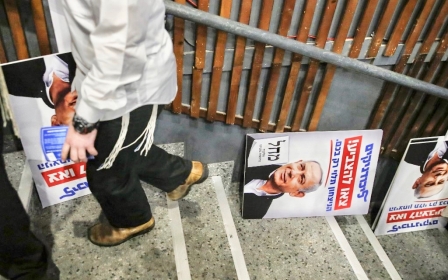Israel's election could unlock Netanyahu's unstoppable ambition

Monday’s elections are Israel's most important in its history and will define its future.
If Prime Minister Benjamin Netanyahu wins with his right-wing coalition of Jewish settlers and Ultra-Orthodox parties, Israel will become a different country. The changes will be immediately noticeable.
They will transform Israel into a much more clerical and less democratic nation, far more aggressive and repressive of Palestinians in the occupied West Bank and besieged Gaza Strip. Such a scenario may lead Israel to a new war on both fronts, with an explosive potential that Lebanon's Hezbollah may add to.
This feeling of urgency, of Israel facing its last chance, may sound familiar. This warning has been made a few times in the past and especially over the past 15 months, when Israel's political paralysis has resulted already in two elections ending in deadlock.
It is a deadlock that is serving Netanyahu, who can continue to lead a government in transition as long as there is no political break.
Ruling since 2010, he has been relentless in killing the two-state solution. His plan has been of divide and rule. Domestically, he has incited against Palestinian citizens of Israel, portraying them as traitors and second-class citizens.
Outside the country, he has done everything possible to drive a wedge between the Palestinian Authority's (PA) West Bank and the Hamas-controlled Gaza.
Netanyahu’s vision has always been to build more Jewish settlements, to confiscate more Palestinian land and eventually to create one state from the Mediterranean Sea to the Jordan River, controlled by Jews with Palestinians as residents with no political rights.
Netanyahu’s dreams had to face reality a few years ago, slowed under pressure from then-US President Barack Obama, who forced the prime minister to manoeuvre. Publicly, Netanyahu accepted the idea of an independent Palestinian state alongside Israel, but behind closed doors he did everything he could to sabotage it.
Then Donald Trump entered the White House in January 2017 and the Middle East's dynamic and Israeli-Palestinian relations took a dramatic turn.
Trump selected his son-in-law Jared Kushner and his lawyer David Friedman to be close Middle East advisers, both American Jews known as ardent supporters of Netanyahu, the Israeli right, Jewish settlers and the idea of a “Greater Israel”.
No wonder then that US policy became obviously biased and resulted in the pro-Israeli, anti–Palestinian plan that has been dubbed the “deal of the century”.
Emboldened, Netanyahu has rushed to expand Jewish settlements, further Judaize Jerusalem and its surroundings, annex chunks of the West Bank and bring the military's iron fist down on Gaza.
In his unstoppable ambition, he has also exploited the concerns of neighbours about the expansionism from Iran and its allies across the Middle East.
Saudi Arabia, the United Arab Emirates and some of their allies have on some occasions made dramatic changes to their relationship with Israel, whether formally or in secret. This has weakened some of their traditional and historical support for the Palestinian cause.
Three developments can stop Netanyahu from becoming an Israeli Erdogan and Israel turning into a democtatorship.
The first and most important would be for Netanyahu and his bloc to lose the elections or be left again unable to form a governing coalition in their desired mould.
Such a scenario is possible only if Netanyahu's rival, former army chief of staff Benny Gantz, gets enough seats to form a minority government with the tacit support of the Joint List bloc of Palestinian parties within Israel. Though not a dove, Gantz is ready to consider a different path to Netanyahu and negotiate with the Palestinians.
The second development depends on the Israeli security and military chiefs. It is no secret that most prefer Gantz.
For years, the Israeli security establishment has lived with an inherent contradiction, advocating for the government to make diplomatic and territorial compromises in order to make deals with the Palestinians, while at the same time not hesitating to take aggressive steps against them.
The third way in which Netanyahu’s plans may be reversed is through this year's US elections. If Trump is ousted and a Democratic candidate returns to the White House, Israel will be forced to adjust itself to the new reality of a more balanced and less pro-Israeli Middle East policy.
This will be especially true if Bernie Sanders is elected the next president. Sanders has promised to curb the power of AIPAC, the pro-Israel lobby, and to reinstate the two-state solution.
But if Netanyahu continues to rule, one way or another, Israel and the world will wake up on Tuesday to a much bleaker reality. The Jewish state will be more corrupt, religious-nationalist, less tolerant and liberal, and more belligerent at the expense of the Palestinians.
Middle East Eye delivers independent and unrivalled coverage and analysis of the Middle East, North Africa and beyond. To learn more about republishing this content and the associated fees, please fill out this form. More about MEE can be found here.




